Academies elect faculty from various disciplines
By Jessamine Chan, Steve Koppes, Seth Sanders, Josh Schonwald and Peter SchulerGraduate School of Business and News Office
The American Academy of Arts and Sciences and the National Academy of Sciences have elected to their memberships 11 members of the University faculty.
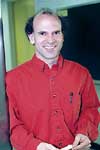 John Carlstrom |
John Carlstrom is among 72 new members and 15 foreign associates from 12 countries elected to the National Academy of Sciences for 2002.
The National Academy of Sciences elects members in recognition of their distinguished and continuing achievements in original research. Election to membership in the academy is considered one of the highest honors for a U.S. scientist or engineer. Those elected last month bring the total number of active members to 1,907.
Carlstrom, the S. Chandrasekhar Distinguished Service Professor in Astronomy & Astrophysics and the College, last year led a team of cosmologists who put a theory called cosmic inflation to exacting observational tests at the Center for Astrophysical Research in Antarctica. In so doing, Carlstrom and his team verified the big-picture physics of the early universe.
Carlstrom is a fellow of the James McDonnell Foundation, the John D. and Catherine T. MacArthur Foundation and the David and Lucile Packard Foundation. He also has received NASA’s Medal for Exceptional Scientific Achievement.
The American Academy of Arts and Sciences, which was established in 1780 by John Adams, James Bowdoin, John Hancock and other scholar-patriots, has elected 10 University professors as 2002 fellows.
The 10 faculty members elected to this American research institution and learned society are Carlos Kenig, the Louis Block Distinguished Service Professor in Mathematics and the College; Susan Kidwell, Professor in Geophysical Sciences and the College; Edward “Rocky” Kolb, Professor in Astronomy & Astrophysics and the College; Steven Levitt, Professor in Economics and the College; Peter McCullagh, the Ralph and Mary Otis Isham Professor in Statistics and the College; Bernard McGinn, the Naomi Shenstone Donnelley Professor in the Divinity School; David Strauss, the Harry N. Wyatt Professor in the Law School; William Tait, Professor Emeritus in Philosophy and the College; Robert Vishny, the Eric J. Gleacher Professor and a Distinguished Service Professor of Finance in the Graduate School of Business; and Thomas Witten, Professor in Physics and the College. They are among the 177 new fellows and 30 foreign honorary members elected this year.
Members of the academy are elected into five distinct classes: mathematical and physical sciences; biological sciences; social sciences; humanities and arts; and public affairs, business and administration. The structure of the academy allows its fellows to conduct interdisciplinary studies that draw on this range of academic and intellectual disciplines.
“The American Academy is unique among America’s academies for its breadth and scope,” said academy executive officer Leslie Berlowitz. “Throughout its history, the academy has gathered individuals with diverse perspectives to participate in studies and projects focusing on advancing intellectual thought and constructive action in American society.”
Benjamin Franklin and George Washington are among the first fellows to become members of the American Academy of Arts and Sciences, and its current membership includes more than 150 Nobel laureates and 50 Pulitzer Prize winners.
 Carlos Kenig |
Carlos Kenig was elected to the mathematics section of the American Academy of Arts and Sciences. His research focuses on applications of harmonic analysis to partial differential equations, with emphasis on problems in non-linear evolutions, free boundary problems and uniqueness questions.
Kenig has been awarded fellowships from the Alfred P. Sloan Foundation and the John Simon Guggenheim Memorial Foundation and is a recipient of the Salem Prize.
 Susan Kidwell |
Susan Kidwell was elected to the academy’s evolutionary and population biology and ecology section. She specializes in stratigraphic geology and taphonomy, or how physical and biological processes determine the resolving power of the fossil record.
Kidwell has been a Presidential Young Investigator of the National Science Foundation and a recipient of the Charles Schuchert Award from the Paleontological Society and of the Quantrell Award for Excellence in Undergraduate Teaching.
 Edward “Rocky” Kolb |
Edward “Rocky” Kolb was elected to the academy’s astronomy & earth sciences section.
Kolb, a cosmologist, heads the Theoretical Astrophysics Group at Fermi National Accelerator Laboratory. His field of research is the application of elementary particle physics to the very early universe.
Kolb is a fellow of the American Physical Society and a recipient of the Quantrell Award for Excellence in Undergraduate Teaching. His book Blind Watchers of the Sky, written for the general public, received the 1996 Emme award from the American Astronautical Society.
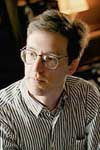 Steven Levitt |
Steven Levitt has been elected to the academy’s economics section.
A faculty member since 1997, Levitt recently has done research focusing on the economic aspects of crime and corruption, the criminal justice system, abortion legalization and school choice.
Levitt, editor of the Journal of Political Economy, received the Presidential Early Career Award for Scientists and Engineers in 2000 and the University’s Quantrell Award for Excellence in Undergraduate Teaching in 1998.
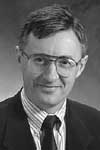 Peter McCullagh |
Peter McCullagh was elected to the academy’s mathematics section. His specialty includes generalized linear models and the application of abstract algebra to statistics and statistical models.
McCullagh’s honors include the Alison Powell Memorial Prize from the University of Birmingham and the Royal Statistical Society’s Guy Medal in Bronze. He also is a fellow of the Institute of Mathematical Statistics, the American Association for the Advancement of Science, the Royal Society and the American Statistical Association.
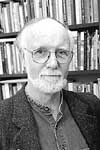 Bernard McGinn |
Bernard McGinn has been elected to the academy’s philosophy and religious studies section. McGinn has written widely on apocalypticism, mysticism and spirituality in the Western Christian tradition.
Currently, he is working on one of his largest projects, a history of Christian mysticism titled The Presence of God, of which he has completed three volumes. McGinn has taught at Chicago for more than 30 years since completing theological studies at Pontifical Gregorian University in Rome and earning a Ph.D. from Brandeis University.
In addition to his work on The Presence of God, McGinn has been involved in the popular Classics of Western Spirituality. This series, for which McGinn has been an editor since its inception and editor in chief since 1988, includes more than 100 published volumes, which are widely used in classrooms.
McGinn also has edited Volume 2 of The Encyclopedia of Apocalypticism. His newest book, The Man from Whom God Hid Nothing, is about the medieval Christian mystic Meister Eckart, who preached a complex message of mystical contact with God in popular language to a general audience.
 David Strauss |
David Strauss, one of the nation’s leading scholars in constitutional law and related fields, was elected to the academy’s law section. He is the author of a series of papers that challenge the conventional assumption that the text of the written Constitution is central to the American constitutional system, arguing instead that American constitutional law is based on tradition and precedent.
Strauss also has written influential articles on racial discrimination, affirmative action, the First Amendment and other subjects.
Additionally, he is a respected appellate advocate who has argued 17 cases before the U.S. Supreme Court. He has served as special counsel to the Judiciary Committee of the U.S. Senate, and before he joined the Law School faculty, as Assistant Solicitor General of the United States.
Strauss was voted the Law School’s annual award for teaching excellence by the graduating classes of 1996, 1998 and 2000. He teaches constitutional law, federal jurisdiction and the first-year class in elements of the law. He is a member of the board of Directors of the Laboratory Schools and an editor of the Supreme Court Review.
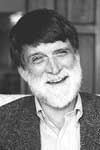 William Tait |
William Tait has been elected to the academy’s philosophy and religious studies section. A member of the Chicago faculty since 1972, Tait was chairman of the Philosophy Department from 1981 to 1987 and became a Professor Emeritus in 1996.
Tait has taught at Stanford University, the University of Illinois at Chicago and the University of Aarhus in Denmark.
He has published groundbreaking articles focusing on the areas where philosophy and mathematics intersect, including “Normal Derivability in Classical Logic” and “Infinitely Long Terms of Transfinite Type” as well as studies of such philosophers as Frege and Cantor.
Recent essays include “The Myth of the Mind” and “Beyond the Axioms: The Question of Objectivity in Mathematics.”
Currently, Tait’s main areas of research are logic and the philosophy of mathematics and its history. He presently is finishing a collection of his essays provisionally titled The Provenance of Pure Reason: Essays in the Philosophy of Mathematics and Its History, to be published by Oxford University Press, as well as working on a book titled Meaning, Knowing and Understanding: A View From Outside, to be published by Open Court Press.
 Robert Vishny |
Robert Vishny, who has been elected to the academy’s economics section, joined the faculty of the Graduate School of Business in 1985.
Vishny’s research focuses on the market for corporate control, corporate governance around the world, privatization and the role of government in the economy, the behavior of institutional investors, the behavior of stock prices, and the economics of corruption and rent-seeking behavior.
He currently serves as a trustee for the College Retirement Equities Fund and is a founding partner in LSV Asset Management. From 1991 to 1998, he served as director of the program in corporate finance at the National Bureau of Economic Research.
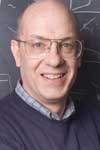 Thomas Witten |
Vishny has been associate editor of the Journal of Finance and the Journal of Financial Economics, and he served as director of the American Finance Association from 1994 to 1996. He also was an adviser to the Russian Privatization Ministry from 1992 to 1995.
Thomas Witten was elected to the academy’s physics section. A theoretical physicist, Witten specializes in the study of polymers (found in Styrofoam cups), complex fluids (including paint and toothpaste) and aggregation phenomena (such as the way snowflakes clump together). Witten looks for mathematical laws that govern these unconventional forms of matter.
Witten is a fellow of the American Physical Society and a recipient of the society’s Polymer Physics Prize.
![[Chronicle]](/images/small-header.gif)